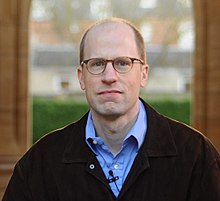Nick Bostrom
| Nick Bostrom | |
|---|---|

Nick Bostrom, 2014
|
|
| Born | Niklas Boström 10 March 1973 Helsingborg, Sweden |
| Institutions |
St Cross College, Oxford Future of Humanity Institute |
| Alma mater |
|
| Thesis | Observational Selection Effects and Probability |
| Known for |
Superintelligence: Paths, Dangers, Strategies, existential risk, anthropic bias, the reversal test, the simulation hypothesis, ethical consequentialism |
| Notable awards |
|
|
Website NickBostrom |
|
Nick Bostrom (English /ˈbɒstrəm/; Swedish: Niklas Boström, IPA: [ˈbuːˌstrœm]; born 10 March 1973) is a Swedish philosopher at the University of Oxford known for his work on existential risk, the anthropic principle, human enhancement ethics, superintelligence risks, the reversal test, and consequentialism. In 2011, he founded the Oxford Martin Programme on the Impacts of Future Technology, and he is currently the founding director of the Future of Humanity Institute at Oxford University.
He is the author of over 200 publications, including Superintelligence: Paths, Dangers, Strategies (2014), a New York Times bestseller and Anthropic Bias: Observation Selection Effects in Science and Philosophy (2002). In 2009 and 2015, he was included in Foreign Policy's Top 100 Global Thinkers list. Bostrom's work on superintelligence – and his concern for its existential risk to humanity over the coming century – has brought both Elon Musk and Bill Gates to similar thinking.
...
Wikipedia
